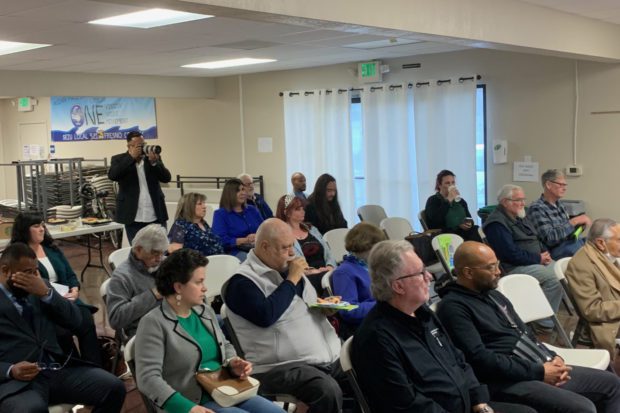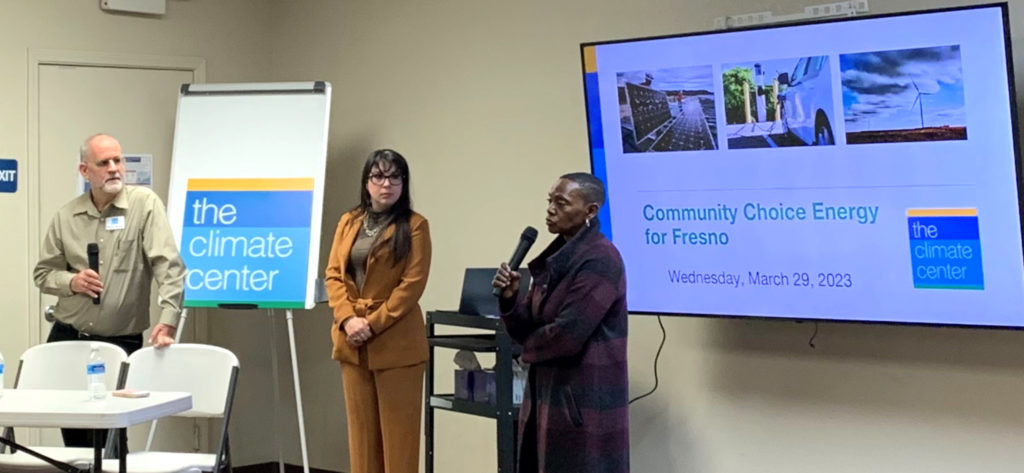
By Rob England

The Climate Center, a 501(c)(3) nonprofit that has been a leader in creating climate solutions and action plans for a climate-safe future in California, hosted a community meeting in Fresno on March 29 to explore New Choices in Electricity Service for Fresno with elected leaders, the community and climate change activists.
Fresno City Council Members Luis Chavez and Nelson Esparza addressed the gathering regarding efforts by the City of Fresno. There was a presentation by Peninsula Clean Energy, and others shared experiences in their respective communities. Venise Curry, Climate Center vice chair, spoke on healthcare issues and engagement of disenfranchised communities.
Community choice energy, also known as Community Choice Aggregation (CCA), is a concept that has been gaining popularity among local governments and communities in California. Essentially, a CCA program allows communities to choose where their energy comes from, rather than being limited to the offerings of the local utility company. This not only benefits the community in terms of cost savings and greater energy independence but also has positive impacts on small businesses and the environment.
This concept is not new. In California alone, there are already 25 operational CCAs with more than 15 million customers in 200-plus cities in more than 20 counties. These efforts are supported by hundreds of elected officials.
Benefits to the Community
One of the main benefits of CCA to a community is that it offers choice and greater control over a city’s energy supply. Instead of being beholden to the decisions of a large, distant utility company, residents and businesses can have a say in where their energy comes from and how it is produced.
This can foster a sense of community engagement and ownership, as well as promote transparency and accountability in the energy sector. We all deserve choice.
Another benefit of CCA is increased energy independence. By choosing where energy comes from, the reliance on fossil fuels can be reduced while moving toward cleaner, renewable sources of energy. This can help to insulate a community from fossil fuel price volatility, reduce the carbon footprint and contribute to the fight against climate change.
Roughly $150 million leaves the Fresno economy in the form of energy costs annually. With CCA, these millions would be redirected to local control.
In addition, CCAs have the potential for cost savings. By pooling the energy demand of a community and negotiating with energy suppliers on behalf of the residents and businesses, a CCA program can often secure better rates than what would be available from the local utility company.
This means that residents and businesses can potentially save money on their energy bills, which can be especially beneficial for those on fixed incomes or struggling financially. Think of it like when you buy in bulk to save money.
Benefits to Small Businesses
Small businesses can benefit from CCA in several ways. First and foremost, lower energy costs can be a significant boon to small businesses, which often operate on tight margins. By potentially saving money on energy bills, small businesses can free up resources to invest in other areas of their operation, such as marketing, hiring or product development.
In addition, CCA can provide small businesses with access to renewable energy sources that might otherwise be cost-prohibitive. Many small businesses are interested in adopting more sustainable practices, but they might lack the resources to install solar panels or purchase renewable energy credits on their own.
By participating in a CCA program, small businesses can benefit from the collective purchasing power of their community and gain access to clean, renewable energy sources at a competitive price.
Benefits to the Environment
Perhaps the most significant benefit of CCA is the potential to help mitigate climate change. By promoting the adoption of renewable energy sources and reducing reliance on fossil fuels, CCAs can help to reduce greenhouse gas emissions and slow the pace of global warming. This not only benefits the environment but also has economic and social benefits, such as reducing the impact of natural disasters, improving public health and creating new jobs in the renewable energy sector.
Already, California CCAs are producing more than 11 gigawatts of clean, locally sourced energy. That is the equivalent power output of four Diablo Canyon–sized nuclear power plants.
Moreover, CCAs can help to promote innovation and technological advancements in the energy sector. As communities demand more clean, renewable energy, energy suppliers will be incentivized to invest in research and development to meet that demand. This can lead to new and innovative energy solutions that benefit communities and businesses alike, as well as drive down the cost of renewable energy and make it more accessible to all.
What needs to be done?
The Fresno City Council has begun a study on CCA and will select a consultant to do this research. It is critical that the Council be open and transparent during this process.
When we come together as one and demand community choice energy, we can all benefit: communities, small businesses and the environment. By giving us greater control over our energy supply and access to renewable energy sources, a CCA program can help us reduce costs, increase energy independence and promote sustainable practices.
In addition, CCAs promote innovation in the energy sector and contribute to the fight against climate change. As more communities across California and the United States adopt CCA programs, these benefits will become even more apparent, driving the continued growth and development of this exciting new approach to how we power our homes, businesses and the fifth largest economy in the world.
*****
Rob England is a Kern County labor and climate change activist and the Central Valley regional coordinator for the Climate Center. Contact him at rob@theclimatecenter.org.
Take Action!
Urge members of the Fresno City Council to remain fair and unbiased when it comes to choosing a consultant to move forward with the City’s Community Choice Aggregation (CCA) program.
In addition, voice your support for CCA at City Council meetings to ensure that the City’s elected officials understand the importance of making CCA in Fresno a reality.
